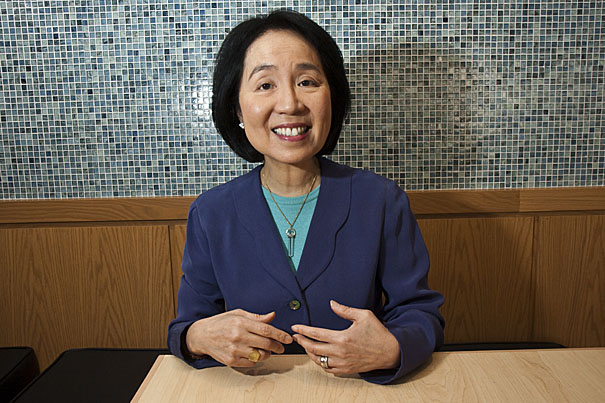
“A lot of us know that we should be eating healthily and exercising to maintain our well-being, but somehow we cannot sustain our effort,” said Lilian Cheung, a nutritionist at the Harvard School of Public Health. “To control our weight, we also need to first understand who we are, how and why we arrive at this circumstance, and how we relate to food. Buddhist teachings on mindfulness help us better understand our true nature: our body, our feelings, our mind, and all that is around us.”
Jon Chase/Harvard Staff Photographer
Buddhism on the dinner plate
New book encourages mindfulness in our eating habits
You’ve heard the old saying: Anything’s possible if you set your mind to it.
Mindfulness, the Buddhist principle of being fully aware of the present, is at the heart of Lilian Cheung’s collaborative book “Savor: Mindful Eating, Mindful Life,” written with Thich Nhat Hanh, a renowned Buddhist monk and author of “Peace Is Every Step: The Path of Mindfulness in Everyday Life.”
According to “Savor,” the practice of mindfulness is an essential tool in ending weight loss struggles for good.
“A lot of us know that we should be eating healthily and exercising to maintain our well-being, but somehow we cannot sustain our effort,” said Cheung, a nutritionist at the Harvard School of Public Health. “To control our weight, we also need to first understand who we are, how and why we arrive at this circumstance, and how we relate to food. Buddhist teachings on mindfulness help us better understand our true nature: our body, our feelings, our mind, and all that is around us.”
Cheung met Nhat Hanh — whom The New York Times considered “second only to the Dalai Lama” among the most influential Buddhist leaders in the West — in 1997 at one of his retreats. “As he was explaining the Buddhist perspective on nutriments to the attendees … I realized that I had the missing pieces to complement what I had learned from nutrition science about the difficulties people face in changing their food consumption and lifestyle habits,” she recalled.
Then and there, Cheung scribbled down in her notebook the idea for a book that has now come to fruition. She showed Nhat Hanh an outline of the book in 2005, when she asked him to co-author it. “To my amazement, he said, ‘Why not?’ ”
Cheung and Nhat Hanh encourage mindfulness practice — being present in everything that we do — as a way to cultivate awareness of our eating and activity habits, and ultimately uproot undesirable habits to improve our health. It may sound difficult, but they show in fact how easy it is to incorporate mindfulness practice in our daily routines. We can breathe, walk, listen, cook, and eat mindfully.
“When you sit down to eat a truly mindful meal, you will see far beyond the rim of the plate,” said Cheung. “Look closely at your salad, and you will see the farmer who planted the seeds, the rain and sunshine, the rich earth that nourished them as they grew. Mindful eating can help us approach the core Buddhist concept of ‘interbeing,’ the recognition that everything and everyone is interrelated. With this as our foundation, we realize that it is important to eat not only for our own health, but in a way that promotes the health of others around us, as well as the health of the planet.
“Our appointment with life is in the here and now, where we have the opportunity to transform our being. We need to learn to stop and look at what is in front of us,” said Cheung. “It is in engaging the present moment that we can change, while finding peace and happiness.”




